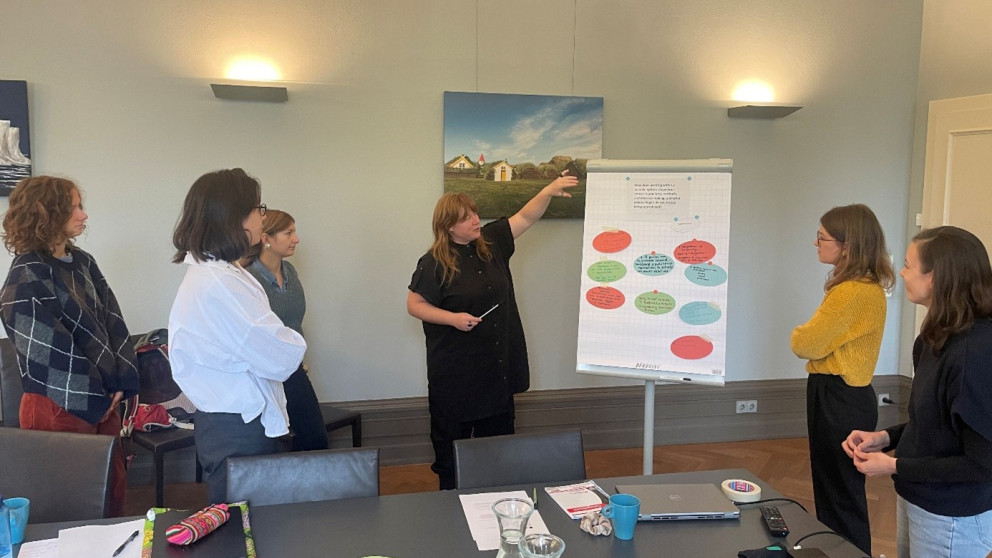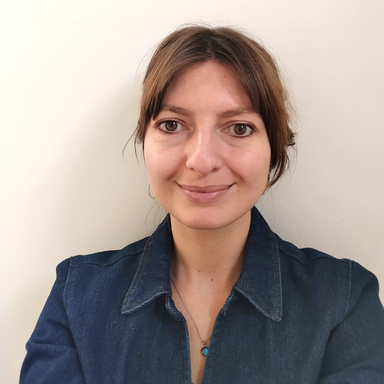Transformative Arctic Research: Lessons from Co-Creative and Community-Led Collaborations
19.11.2025

On October 14th, the reIMAGINE Arctic Research Group held an internal workshop to explore how colonial structures embedded within research systems shape practices and perceptions and to identify ways to decolonize research methods, knowledge, and governance structures in the Arctic. The workshop brought together researchers engaged in co-creative and community-driven projects in Kalaallit Nunaat, Sápmi, Nunavut, and Nunavik, including guest researcher Professor Catherine Dussault from the University of Ottawa. Professor Dussault collaborates on community driven governance, research ethics, and decolonization projects, with a focus on Indigenous self determination in Nunavik. Her research practice centres Inuit knowledge, priorities, and decision making so that research can truly support local objectives and keep research governance with Inuit.
We discussed three main questions:
- How does working within research systems shape your practices, methods and decision-making, and what colonial logics do you notice being reproduced?
- How can we, in practical terms, recognise and respect differences without taking them over or changing them?
- What approaches or methods allow for transformative and decolonial research, within these institutional constraints?
These questions enabled meaningful and honest conversations about the challenges and motivations that decolonial researchers face in the research process, from writing a project proposal to sharing results with the impacted communities.
“Not all forms of knowledge are equally recognized, and transformative research must recognize this and rebuild research on new foundations.” — Catherine Dussault
Transforming Colonial Logics: Examples from Nunavik
Nunavik is the homeland of the Inuit of northern Quebec. Much of today’s research in Nunavik rests on a legacy of unequal power relations, in which researchers from elsewhere have collected data with limited benefit to local communities. Too often, data have been misinterpreted, findings left unshared, consent processes disregarded, and decisions made without adequate contextual understanding. As a palimpsest of these colonial logics, contemporary academia continues to reproduce epistemic hierarchies that fail to value all Knowledges equally.
Catherine Dussault shared several examples of recent efforts in Nunavik that aim to transform such research practices. For example, Atanniuvik is a research governance organization that manages and oversees research in Nunavik in ways that promote Inuit self determination. It aims to change how research is approved, conducted and shared so that communities benefit directly and retain control of outputs. NORDvik (Nunavik’s Own Research Database) is a community database and online portal in development by Atanniuvik, with the support of teams from University of Ottawa, Université Laval, Carleton University, and University Cornell. NORDvik will make research accessible to all, including Nunavimmiut (Nunavik Inuit). “Vik” signals locality and time in Inuktitut and the project focuses on community priorities and governance as sustainable in the long-run.
Still, in Nunavik and other regions across the Arctic, further change is needed to mainstream transformative, community-led research: research that seeks to reverse colonial dynamics by building relationships of trust based on accountability and historical awareness among all partners. This shift of perspective and modus operandi allows research to support local priorities, build capacity, and respect and centre Indigenous knowledge systems and governance.
“Decolonization starts by building relationships: with the land we are standing on and the Indigenous Peoples who are the guardians of this land. It also means to engage with history to move beyond destruction, dispossession and appropriation.” — Catherine Dussault
Positionality, relationality, and responsibility
But how can this transformation take root within colonial institutions themselves? The group discussed that a first and fundamental step is to acknowledge and recognize one’s own positionality. This means also challenging the alleged neutrality of the researcher: we are humans and as such we bring world views, values, and ideas to our research. Rather than hiding behind the concept of neutrality, acknowledging it is the start of building respectful relationships. As Catherine Dussault noted, “Speaking of hegemonical research doesn’t place you outside of these institutions.” Researchers’ intentions matter, but so do the institutional modalities through which intentions are carried out. Furthermore, the fact that research relations are fundamentally human shapes how knowledge is produced and shared.
Reflections on Methods and Approaches
The sharing of experiences underscored the insight that transformative research depends not only on good intentions but on accountability, historical awareness, and long-term relational engagement. Meaningful change is needed across all phases of the research cycle, beyond conventional project timelines. Some methods and approaches we discussed to support this include:
- Recognising Indigenous knowledges as equally valuable and dignified as dominant knowledge systems;
- Implementing informed consent and data sovereignty practices from the outset;
- Establishing agreements that ensure community control over research outputs and access;
- Investing in two-way capacity sharing through training, local hiring, youth engagement, and shared governance;
- Creating meaningful and open spaces for honest and communal reflections;
- Committing to long-term relationships rather than short-term field visits.
Funding mechanisms play a critical role in enabling these changes. For example, including budget lines for fair compensation of all partners and participants, and allocating sufficient time for exchange to strengthen relationships and mutual understanding. Ultimately, funding should be redesigned to support sustained research relationships, not just discrete projects.


